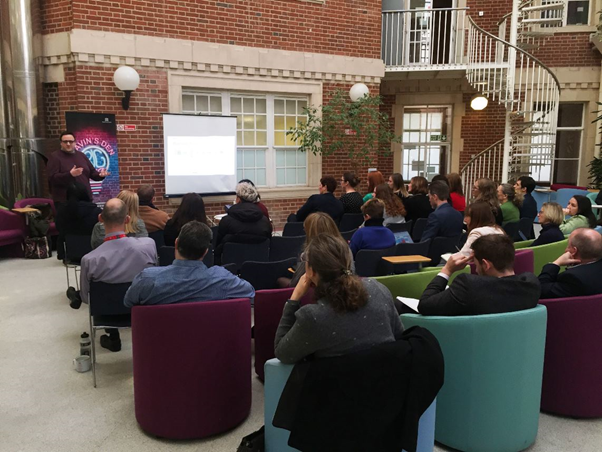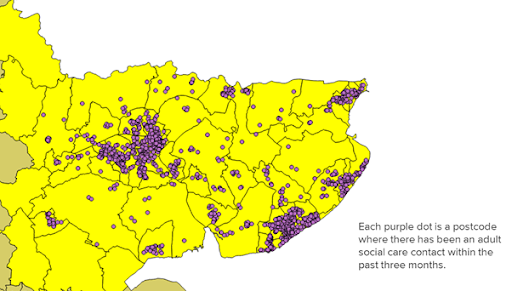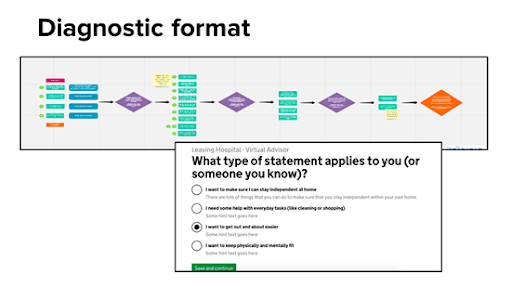We held our first show and talk session on the 30th January to showcase three pieces of service design work, which alongside the Digital Boomers project, form the Empowering Citizens work stream of Essex County Council’s Adults Digital Programme. This was the first combined show and tell session at County Hall, and our plan is to do updates in different locations around the county as the work progresses.

We had a good turnout for the session which was opened up by Rebecca Jarvis, strategic lead for the work stream and active member of the delivery team. After introducing the multidisciplinary team she highlighted the collaborative nature of the work, with team members from across Adult Social Care, the ECC Service Design team and FutureGov working closely with partners from Health.
Adult social care information, advice and guidance (IAG)
First up was Phase 2 of the ‘Transforming Adult Social Care through Information, Advice and Guidance’ project which kicked off in December 2018.
This builds on an initial phase of broad discovery that highlighted how citizens struggle to find the right information, services and support, and that that there are limited tools for people to self-help or better understand and manage their needs. Rebecca went on to talk about how this piece of work aims to support people to do more for themselves so that they can lead healthy, independent and fulfilling lives.
Kevin Marshall was up next and spoke about the research that the team has started, and how we will be focusing our work in North East Essex. To tackle the challenge of Essex’s large and varied geography, the aim is to focus on a place rather than a cohort of people with specific needs. By really understanding the services and other assets in a locality, and how people use them, we will get real insights into people, needs and expectations, and how the system might better support them. These insights can then be used to design new ways of meeting needs which can then be adapted and tested in other areas. Working in North East Essex allows us to build on our existing relationships with health partners, to get up and running quickly whilst ensuring we get a view across the whole system.

Kiran Dhillon then talked about how our research will be focused on two main areas. We need to better understand how demand is currently generated across the system, and also to consider how ECCs services currently manage this demand and what the experience is for users who come though those services.
Kiran went on to share some insights from our early research at the ECC contact centre. We know that sometimes people are looking for more than just information – they really need a conversation and to be heard. We’ve observed that teams in the contact centre work really hard to make the best of the systems and tools that support their work, but that these tools are often quite basic and require constant maintenance. And we have seen that demand is being driven by pressure from the whole health and social care system, with a sense of the county council being the last resort for other organisations.
Kevin then rounded off the update by talking about the next steps. The team will be getting out into the communities of North East Essex, engaging with people, partners and community organisations. We’ll also be mapping people’s journeys, using data to better understand how demand is generated and doing ongoing research in the contact centre.
Organise Care and Support
Ian Hutchison opened up the next section by reminding people about the focus of the Organise Care and Support project, which is looking at how we help people to better understand their needs and access the right support after an unplanned hospital stay. He talked about focusing the work around the people, carers and proxies who have the ability and willingness to organise their own support, and how having the right tools and information can put them more in control of their lives.
Kevin Marshall then talked about how the prototype will be tested in partnership with the Integrated Rapid Assessment Service in the Emergency Admissions Unit of Colchester hospital. This restricted trial aims to ensure that people are both willing and able to use a tool like this when leaving hospital.
He referred to the recent ‘flowcharting frenzy’ that had been required to visualise and map the various user journeys and variations that might be needed to build an effective chatbot-style intelligent assistant into the prototype. In testing people had been overwhelmed by the amount of information that they had to take in, especially when viewing on mobile devices with small screens. Testers had also struggled with navigation and couldn’t easily get back to previous choices.
These challenges have made the team think about simpler ways to get people to the right services and information at the right time, and the next phase of prototyping and testing will take a more diagnostic approach. This will ask four simple questions based on the Care Act criteria of needs, and will then serve personalised results from a directory of services.

Kevin rounded up by covering the plan for the next four waves of testing in the Emergency Admissions Unit at Colchester Hospital. By testing and iterating different aspects of the full service in four consecutive sprints, the aim is to test a full end-to-end service by the end of the private beta over the next 3 months.
Adult social care content on essex.gov.uk
I was up next, talking about some of the work that has already been done to improve the adult social care information as part of the essex.gov.uk programme of work.
The team has redesigned 23 different areas of content, and by taking a user-centred approach has managed to reduce the average page count by 50% and the average word count by 70%. This improvement has been made possible by engagement with wide groups of users and communities, with regular lab-based testing as well as regular surveys and polling of a volunteer panel of testers.
At the moment the redesigned content has updated on the Living Well website, but this content will be used to launch the new beta.essex.gov.uk website in April 2019. The new website platform will be mobile-friendly and will provide much better navigation and search tools. It will also provide much more flexibility to improve people’s user journeys, and will enable us to be much more creative in how we provision information, advice and guidance to meet people’s needs.
I rounded off the show and tell by highlighting how the three pieces of work that had been shared complemented each other. Information, Advice and Guidance aims to get a deeper understanding of people’s needs and prototype ways that they might be better supported across the Essex system. Organise Care and Support is looking at how we might create the right tools to help people to better understand their needs and circumstances at a point of crisis. And the essex.gov.uk project is moving forward our approach to content creation and delivering a flexible, scalable platform which will underpin a wide range of future innovation.
Our next Empowering Citizens show and tell will be in Colchester Library on February 12 – please drop Clare.Perrett@essex.gov.uk a line if you’d like to be added to the invitation list.
Leave a comment